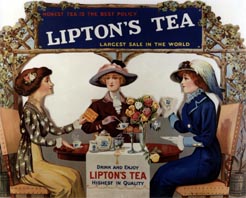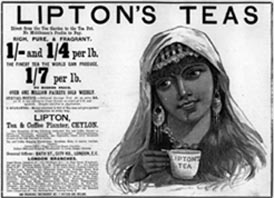Life Story of Sir Thomas Lipton
Tea

After achieving what he had originally set out to do in the general trade provision he turned his attention to tea. Drinking tea had become much more popular in the late 1880s but still was prohibitively expensive for the average working class family. After investigating the trade further with tea brokers in London he took the decision to do what he had done with ham, butter and eggs, that is, "cut out the middleman, with profit alike to myself and my customers". (Lipton, p166) Within a year he was selling huge amounts of tea in pound, half pound and quarter pound packets. The blends were made especially for the area around the shops so that Lipton could advertise "the perfect tea to suit the water of your town". (Lipton, p171)

While he made substantial profits his rule was to abolish "wherever possible, the middleman or intermediary profiteer between the producer and consumer". (Lipton, p174) The only way he could do this was to control the whole production process. He secretly booked a passage to Australia but disembarked at Colombo, Ceylon to visit the plantations for himself.
The summer of 1878 brought a coffee crop failure in the island of Ceylon which all but wiped out that commodity. As a result tea production increased and the purchase price of the plantations was only half of what Lipton had been willing to pay. By using Ceylon to produce the tea it had less distance to travel and was therefore cheaper (traditionally China had been known for producing tea). Within a short period of time he owned five plantations. Now he controlled the whole manufacturing process. Many thought he would fail by not attracting blenders but he proved them wrong: he offered the blenders double their current salary and they soon started working for Lipton. The tea was fresher and, of course, he had a new slogan ready, "Direct from the tea garden to the tea pot." (Crampsey, p48)
Even his 300 shops could not begin to satisfy the demand for tea in packets, at one and seven pence a pound, so Lipton decided to sell it anywhere there was a demand for it, creating that demand by advertising tea as he had his ham and cheese 15 years earlier. In the process Lipton became the trademark of a national commodity. Through tea, “Lipton's” became a household name. His shops had made him a millionaire but tea made him a multi-millionaire.
